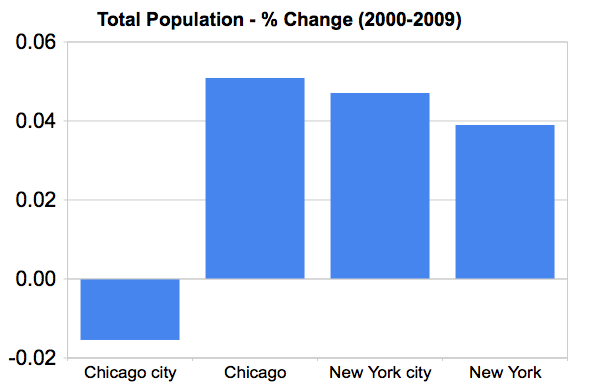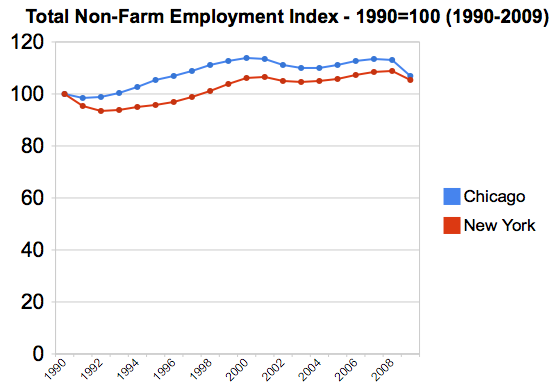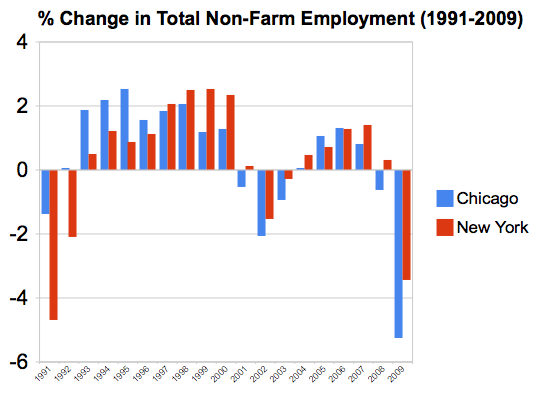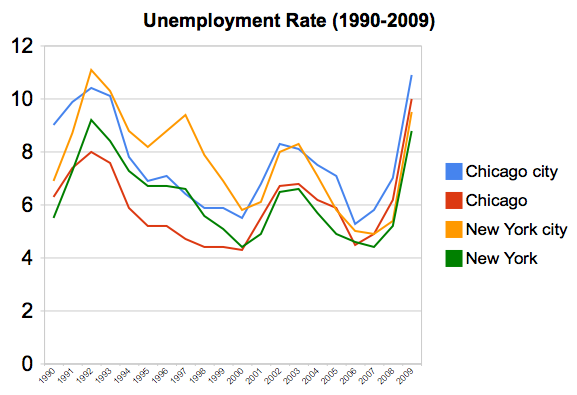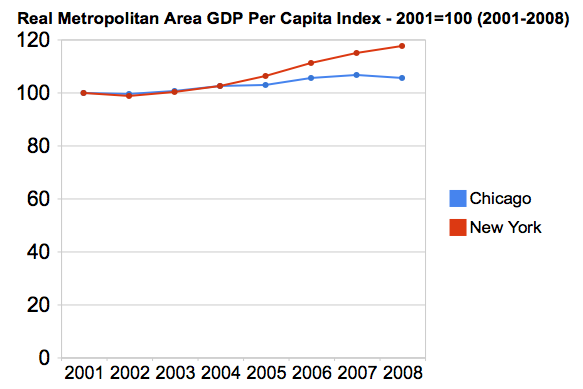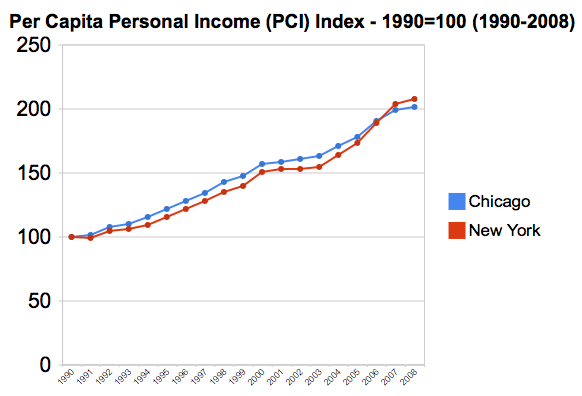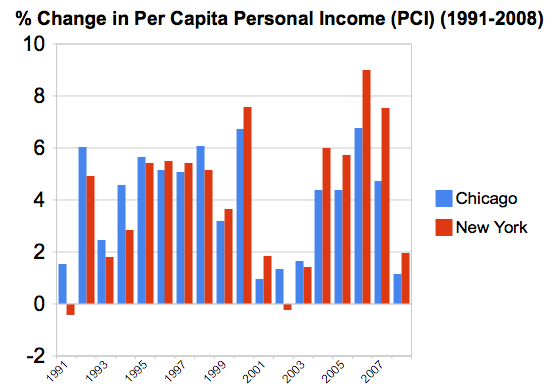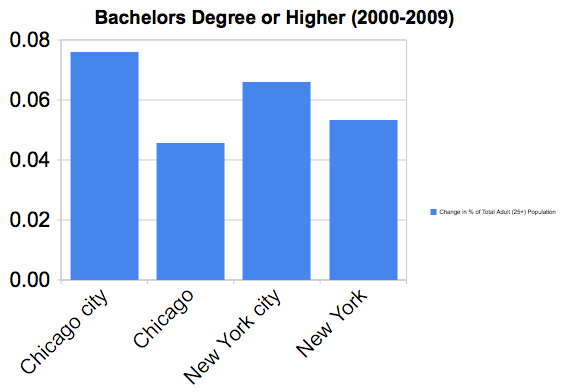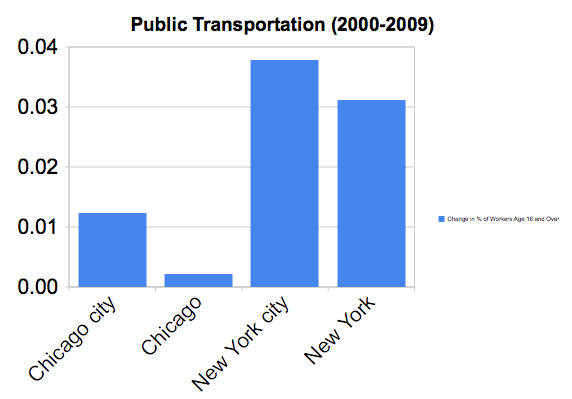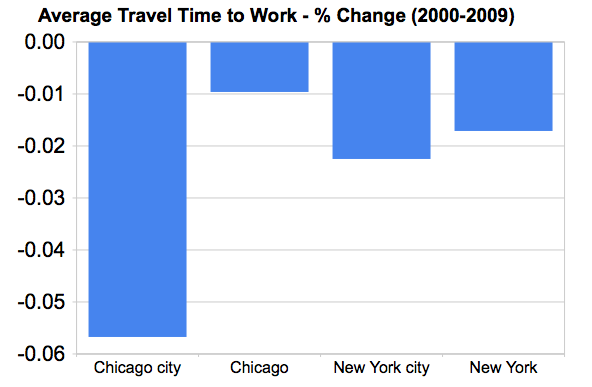Chicago's Eroding Competitive Performance (Chicago vs. New York)
This is another in my Future of Chicago series, examining major issues that go beyond the headlines of the moment in the lead up to the mayoral election.
My Chicago Worldview
A lot of my thinking on Chicago has been shaped by an overarching view of its performance. Believe it or not, I used to be a huge Chicago cheerleader. I don't think there's any doubt that during the 1990's, Chicago rediscovered its mojo and was really tearing up the charts of performance for big cities. But something changed in the mid-2000's. I date it to the opening of Millennium Park. Millennium Park was a huge home run for the city, and obviously a key positive part of Mayor Daley's legacy, no matter what the cost over runs. It added hugely to reconnecting the Loop to the lakefront park system, created a huge tourist attraction, and probably more than any other single factor sparked a residential boom in the Loop itself.
But Millennium Park was also a sort of high water mark for the city. While I can name a lot of great things the city did before then, after that, there have arguably been more negatives than positives, ranging from a failed Olympic bid that monopolized civic attention for far too long, to a white elephant of a partially completed $300M train station under Block 37 (which hopefully will some day look like a wise move in retrospect), to a disastrous parking meter lease. What's more, Chicago started hemorrhaging jobs and its economic performance cratered. I think anyone who looked at the situation honestly would have to admit a good chunk of the wind has gone out of the city's sails. That's not to say Chicago is doomed. It has fantastic strengths and resources. But it is trending the wrong direction.
I think this is massively underdiscussed locally, both because the city is imbued with an admittedly not uncommon booster club society culture, and because America's struggles generally of late make it seem like Chicago is just part of a macrotrend. It is, but it's more than that.
I'm going to illustrate Chicago's reversal today by comparing it to New York City, looking at various key civic performance data. I'll try to compare both metro and city where possible (all data is metro unless explicitly labeled as city), and to back to 1990 where possible, though for many items I could only conveniently get data for the past decade. You'll see that where once Chicago was crushing New York, now the situation has reversed itself, erasing 20 years of relative gains for Chicago.
New York's Quality of Life Program
While reading this I want you to keep in mind my recent post on New York's quality of life agenda. I said I would demonstrate how that is paying dividends, and this post shows that too. Though perhaps I can't claim causation, think about the correlation at least. In the 90's and early 2000's it was Chicago who was the leader in transportation and urban space, with its streetscape program and median planters, the wrought iron fence program, one of the first large scale bike lane deployments, the McDonald's cycle center at Millennium Park, and more. Now Chicago has stagnated while New York powers ahead on all those items I've written about before. It's hard for people to make the mental leap from stagnant transport planning and banal public place design to economic performance. So hopefully this helps make the picture clear.
Population Growth
Here's a chart from the last decade. For these charts, I am sometimes inconsistent on my use of percentages as multiplied by 100 or not. I did not have time to make them consistent, but keep in mind that any 0.XX value should be multiplied by 100 unless otherwise noted.
Population Growth – July 1, 2000-July 1, 2009
Source: Census Bureau Population Estimates Program
This one is a mixed result. Both regions have anemic growth, but Chicago wins on the metro measure while losing on the city measure. Despite the city of Chicago's massive condo building boom, its population has been stagnant.
Jobs
Here is where it starts getting ugly.
Source: BLS Current Employment Statistics
You see Chicago jumping out to a big lead in job in the 90's, only to see that relative performance gain almost completely erased by today. A year by year view shows this in action.
I think this is the scariest one of the bunch. I think back to 1992 when I first started work out of college. My employer was still hiring aggressively in Chicago even though it was during a recession, while one of the first rumors I heard when I started was about an east cost layoff. This chart backs that anecdote up. Now the shoe is on the other foot.
If you pull the monthlies for 2010 to date, the situation is continuing on this trend.
Unemployment Rate
Unsurprisingly, we see the same trend at work in the unemployment rate, where New York was far higher than Chicago in the early to mid-90's, but is now consistently below it.
Source: BLS Local Area Unemployment Statistics
Gross Domestic Product
GDP is a basic measure of economic output. The data is only available at the MSA level for a short term period at present, and there's some debate over how accurate narrow geographic parsing of this variable is, but the same trend is in evidence.
Source: BEA Regional Economic Accounts
Please keep in mind that for this and most of the other charts, I rendered them as percentage type comparisons to make the data comparable between cities. If you looked at the actual underlying values, New York's GDP per capita is already far higher than Chicago's – $57,097 vs. $45,463. The chart above only measures the growth in the spread between them.
Personal and Household Income
Again, not surprisingly, the trend flows through to per capita income:
Source: BEA Regional Economic Accounts
And the year by year view of the same data:
One might argue that this is influenced by the finance bubble that particularly blessed New York. And possibly so. So let's take a look at an alternate data point, median household income from the Census Bureau. As a median value, this should be less likely to reflect huge gains at the high end. Unfortunately, the Census 2000 data for MSAs is based on the old definition, and it wasn't a straightforward matter to recalculate this to current definitions, so here is city only performance for the last decade:
Source: Census 2000 and ACS 2009
Doesn't matter – same result.
Educational Attainment
I'll round out with a couple of additional factors often viewed as important. First, the increase in percentage of adults with a college degree. Note that this is a percentage point change (difference), not a percentage change in the total value.
Source: Census 2000 and ACS 2009
Back to a mixed result, with New York winning on the regional basis, but Chicago doing better in the city.
Commuting
And lastly, a couple of commuting stats. First, public transportation mode share for commuting. Note that this again is a percentage point change, not a percent change.
Source: Census 2000 and ACS 2009
There's debate to be sure on the value of public transit, but clearly New York has outperformed on getting people onto buses and trains. How has that changed commute time? Let's take a look:
Source: Census 2000 and ACS 2009
The city of Chicago had a much bigger drop in commute times. I personally wouldn't be too excited about this since since lower commute times nationally appear to be driven (so to speak) by the poor economy rather than transport efficiency. Whatever the case, New York performed slightly better on a regional basis.
Before concluding I should note that the ACS survey has a margin of error associated with it, which should be taken into account before reading too much into changes in values derived from it. I'm only reporting the headline number.
Conclusion
While Chicago had a couple of bright spots, it's pretty clear that not only is New York ahead of Chicago, something that is to be expected, but it is pulling away. It would be easy to say that New York is one of a kind and that nobody can compete with it. Well, it is one of a kind, and while it isn't a direct competition, Chicago was doing far better than New York as recently as 15 years ago. So it can be done and indeed was being done.
The reality is that Chicago is falling behind versus traditional peer cities, to say nothing of emerging global cities around the planet. Perhaps it's not a direct competition, but if you aren't creating jobs, economic output, and wealth, you aren't going to be able to make the investments to stay relevant. One reason New York has been doing what it has been on the public space and transportation front and Chicago has not is that New York is in a lot better shape financially. We are watching the cultural institutions of Detroit get dismantled before our eyes as that city can no longer afford them. Clearly, Chicago is no Detroit and never will be. But that can serve as a sort of cautionary tale of what happens when the wealth generating capacity of your city erodes. Chicago is going to find it tougher and tougher to keep up unless it figures out a way to restore the regional economic engine to good working order. That, more than anything, is the key challenge not just for the next mayor, but for all the city and regional leadership.

